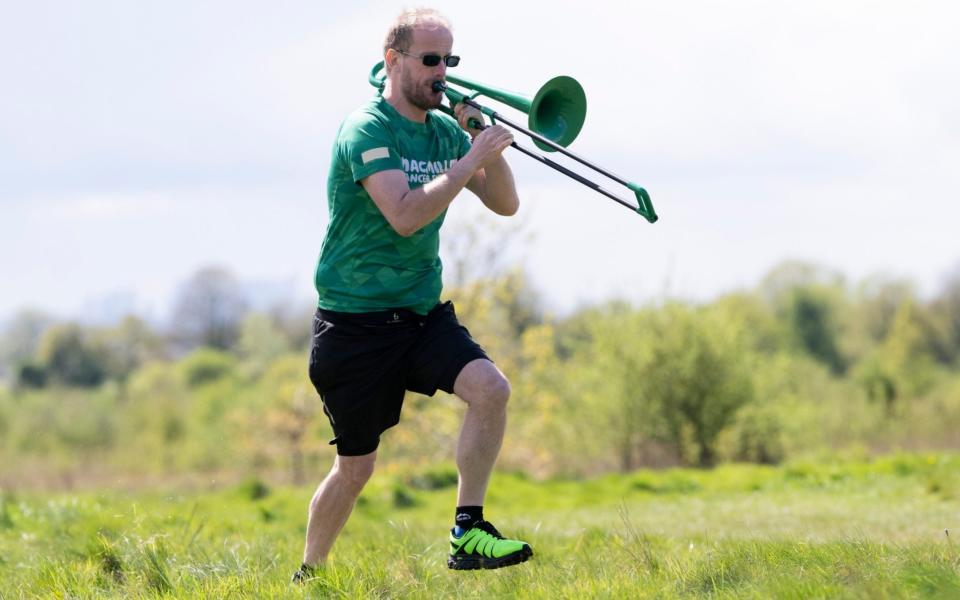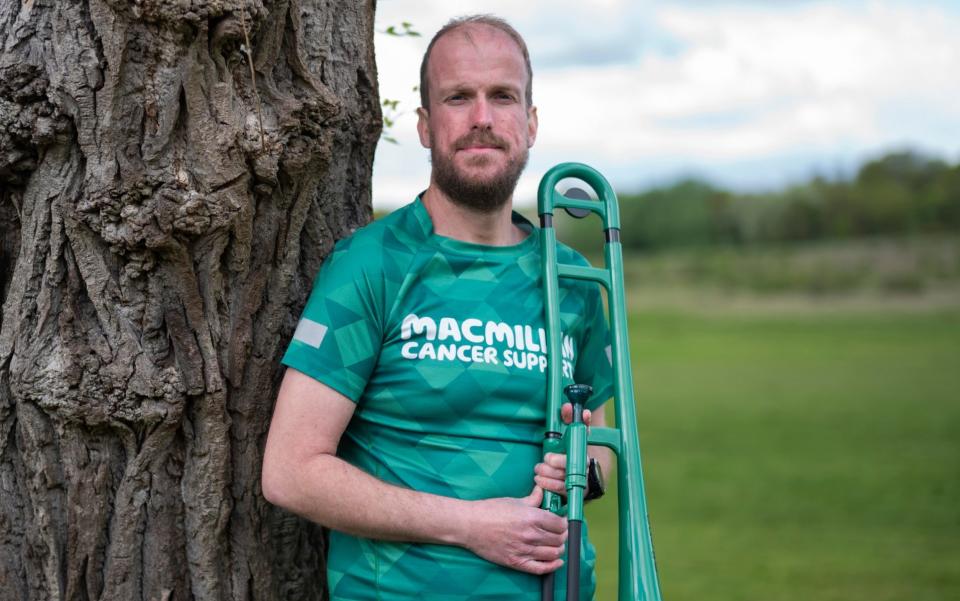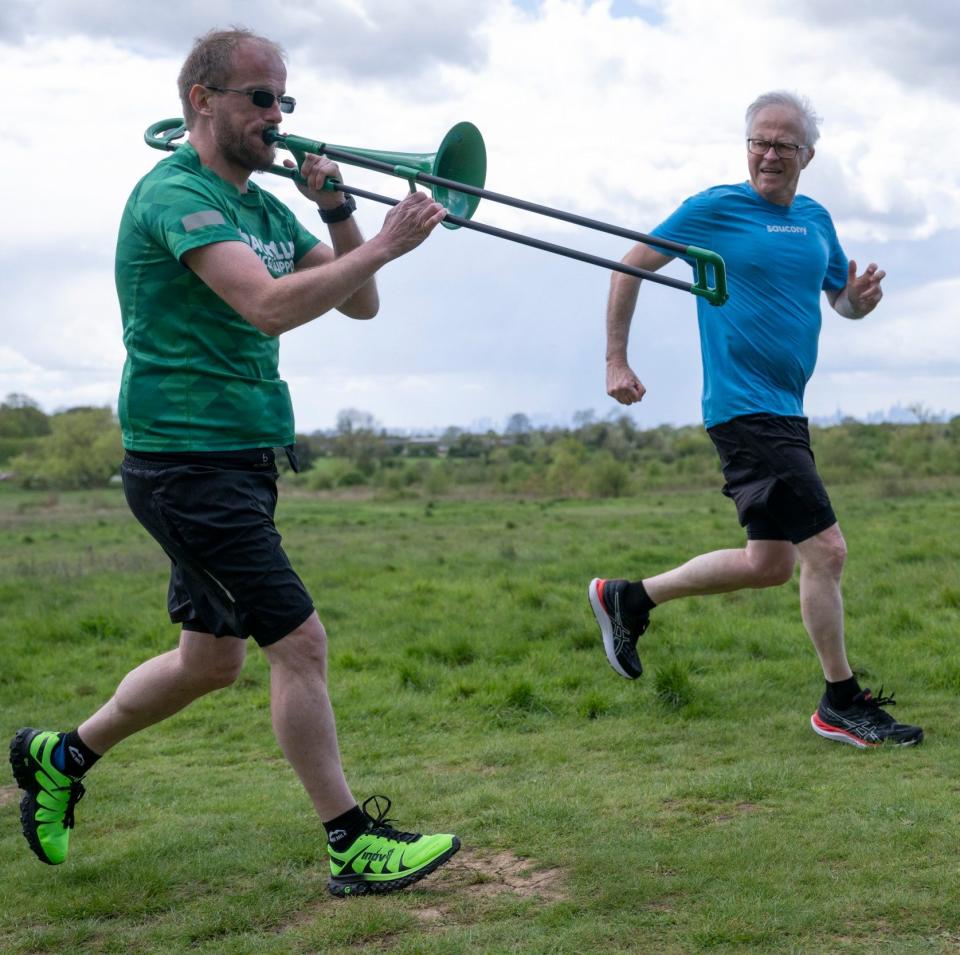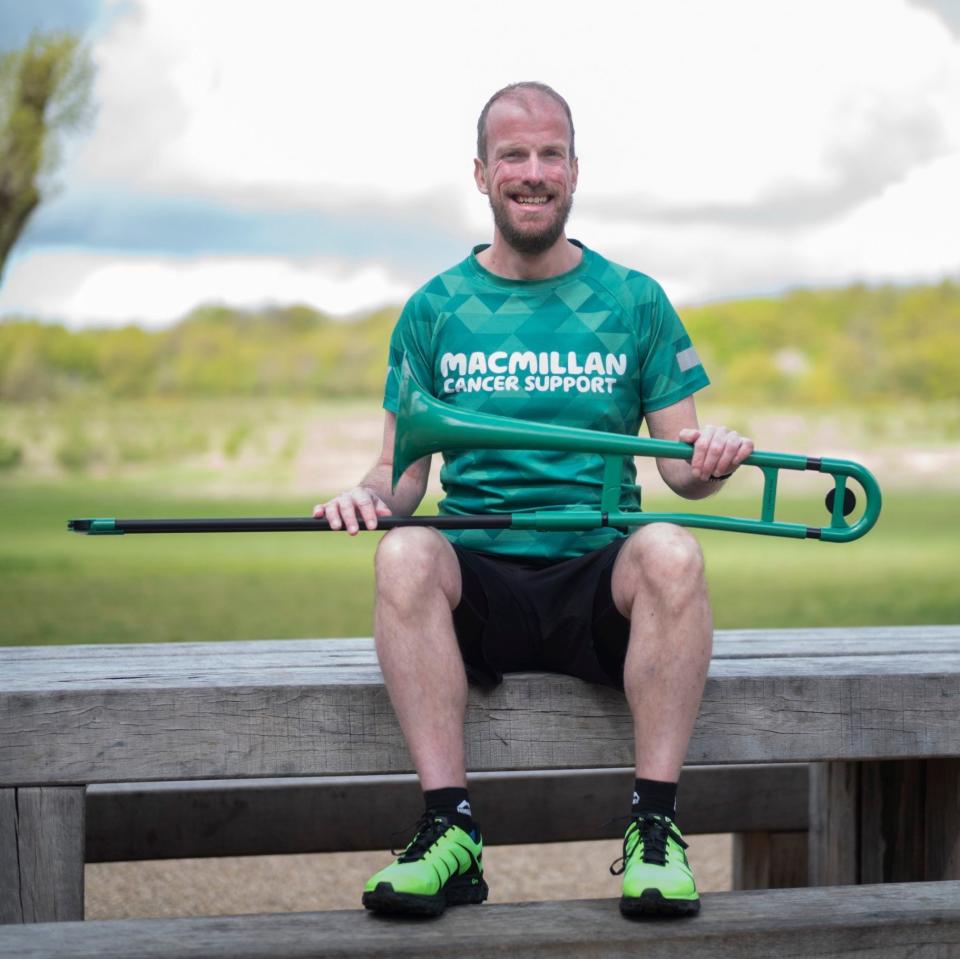‘I have terminal cancer, but I will run the London Marathon playing a trombone’

Anyone watching - or indeed running in - Sunday’s London Marathon won’t be able to miss Nathaniel Dye. If you don’t spot his bright green MacMillan Cancer Support fundraising t-shirt, then you’ll definitely hear him. For Dye plans to play the trombone continuously as he runs the 26 and a bit mile course.
“I’ll be taking requests,” the 38-year-old music teacher says, as he runs with Telegraph Sport in the hills of Hainault Country Park, the entirety of the course spread out in the distance beyond him. And off he goes, giving as he runs a vivid interpretation of Flight of the Bumblebee, followed by a brisk Jerusalem and, naturally, the theme from Chariots of Fire.
“I prefer upbeat pieces, because they tend to have shorter notes. Ballads with long notes require a bit more breath,” he says. “I’ll have to do a thirty second blast, then stop for a few strides. Running and playing at the same time makes breath control very difficult.”
He has a point. For anyone who has run the marathon, the very idea of having enough breath spare to pump out a tune on a brass instrument as you labour on is absurd. But Dye, an accomplished trombonist, is looking forward to the challenge, grinning about its very scale.
“It’s not going to be easy,” he says. “But it will be fun trying.”
And there is something else that makes Dye’s effort all the more noteworthy. In October 2022 he was diagnosed with stage four bowel cancer. The tumours have spread to his lungs, his liver and his lymph nodes. He has been told his chances of living beyond five years are vanishingly slim. This is a man running on a death sentence.

“People have said to me: why are you doing this?” he says of his marathon effort. “They say: shouldn’t you be lying on a beach somewhere? But that’s just not me. What’s the point of just sitting there? What makes me happy is the achievement of doing something active.”
So he will be out on Sunday, blowing on a specially designed lightweight plastic trombone finished in the same vibrant colour as his running shirt.
Not that he has been able to do much in the way of training.
“Those few months when you should be slowly building up your distances, I’ve been dealing with chemotherapy,” he explains, between blasts. “The side effects are really debilitating. Low immune system, diarrhoea, feeling exhausted. This year I’ve had about a week of feeling approximately normal.”
Which means he has barely trained, his longest distance a 5km Park Run the other Saturday. Dye does, though, have one thing going for him. Before cancer struck, he was a highly accomplished ultra-marathon runner. When he was at his peak, 26.6 miles represented a warm up lap. In 2021 he came 13th in the Beacon’s Way race ultra-marathon, running 106miles in 36 hours. He knows precisely what it takes to push himself to his limit and beyond.

“The longer you go, the more it is about a mental battle. It’s about keeping yourself going despite it hurting,” he says. “When I have that determination nothing is stopping me. Besides, I don’t need to hold back, to save anything for the next thing. Because it’s very likely there is not going to be a next thing.”
He had taken up ultra-running to cope with his grief after he lost his partner Holly to ovarian cancer when they were both 25 (this is not a man blessed with luck; four years ago his mother died of the same cancer he now has). Initially after Holly died, he had slumped on the sofa, comfort eating, ballooning in weight. His brother suggested he ought to get out running. And he found the more he did, the longer he ran, the more it helped.
“2021 was my purple patch, I ran so consistently, setting personal bests at all distances,” he says. “Then I started losing energy, I was lethargic, my speed disappeared. By September 2022 I was ticking every single box of bowel cancer. But being a bloke I was shrugging it off. I’d be running and be struck with the kind of pain which made me think I had appendicitis. I was stopping in the middle of runs to let the wave of pain pass.”
By the time he finally sought medical help, his condition was already terminal. He was operated on, and had much of his insides removed. But the tumours are now so widespread as to be inoperable.
“I was a wholefood vegan, I’d stopped drinking completely, I didn’t smoke, I was incredibly fit. I was about as healthy as possible and here I am with a cancer associated with poor diet and not exercising. The irony is not lost on me. But does it matter? The most unhelpful approach is: why me? There’s no point bemoaning it.”

Instead, he has set about doing what he wants to do. A passionate advocate of the importance of musical education, between treatment cycles he has returned to work sharing with children his love of music. Plus last year he did a 100 mile race, he competed in the UTMB (the mega marathon round Mont Blanc) and, chemotherapy allowing, he has ambition to run from John O’Groats to Land’s End this summer.
“My doctor has never told me not to do these things,” he says. “Maybe they think: I’m dying anyway, why tell me not to exercise? My life isn’t over. I’m not about to say: OK I give up, measure me up for a coffin. I want to show it’s possible to live even if you’ve got cancer.”
So there he will be on Sunday, blowing his own trombone.
“If you are looking for artistic integrity, this is not the time,” he says of how he expects his playing to sound as he pants round the course. “We’re not talking symphonic quality here.”
As for his running, it will, he says, be slow.
“I’m a shadow of my former self. For one thing I’m going to have to stop to change colostomy bags. I’ve got friends and family to look out for me with spares.”
But such minor inconveniences will not stop a man as determined as Nathaniel Dye.
“On the good days I feel great, I get runner’s high and I can forget I’ve got cancer,” he says as he disappears off to do some more training, pumping out the tunes, not so much raging as tooting against the dying of the light.
You can donate to Nathaniel Dye’s campaign for Macmillan Cancer Support by visiting https://bowelcancerbucketlist.com

 Yahoo Sport
Yahoo Sport 




































































